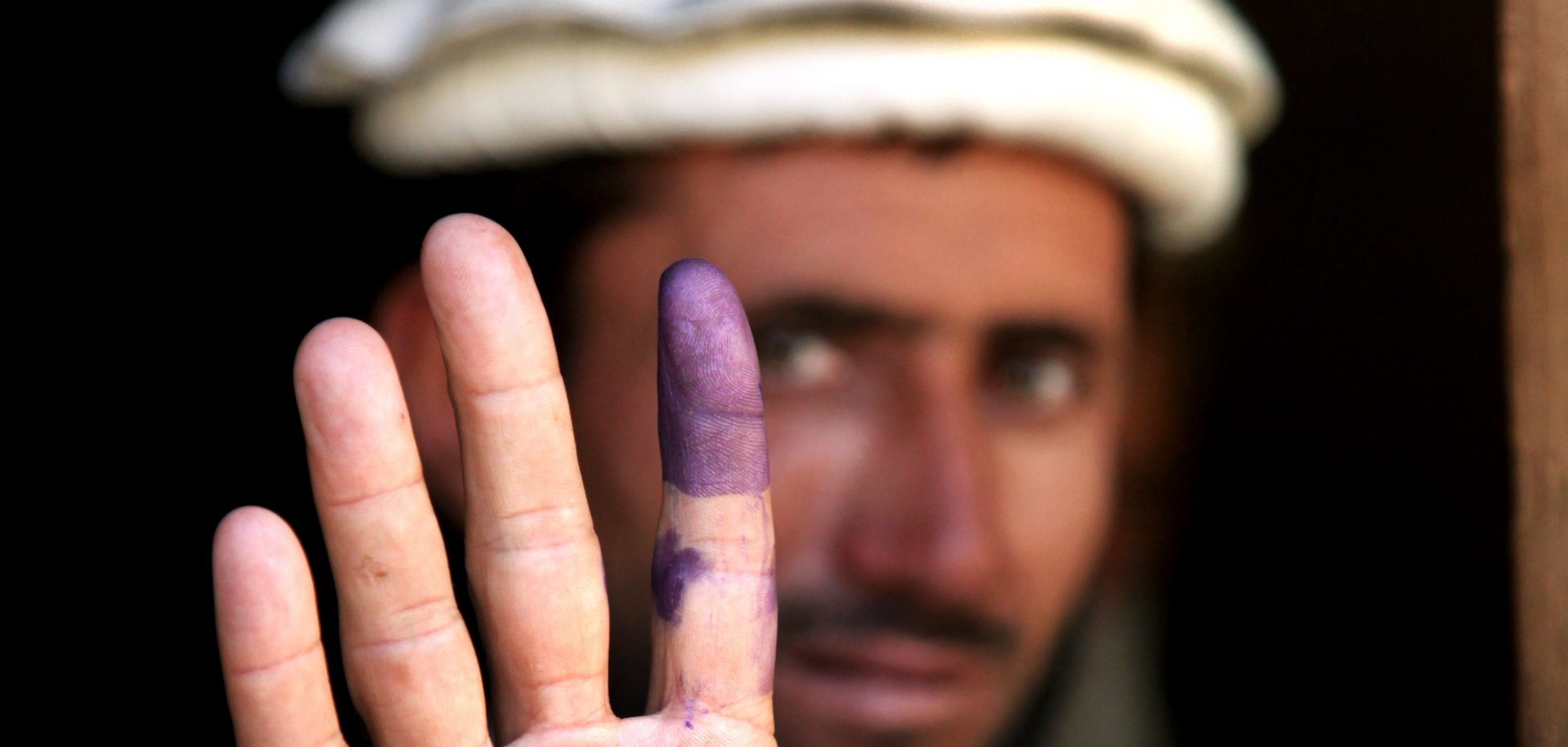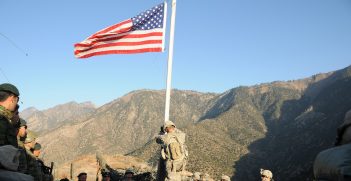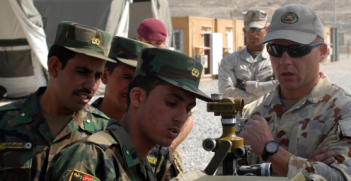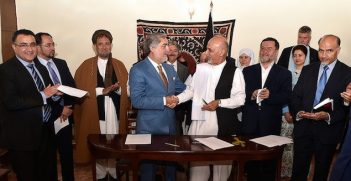Afghanistan's Presidential Elections: Ghani or Abdullah?

US Secretary of State, John Kerry, makes a second, unannounced election-related visit to Kabul, as the country awaits the outcome of the recount of votes, for the run-off of the 2014 Afghan presidential elections, which is expected in mid-August.
Hopes that an orderly transfer of Afghanistan’s presidency from Hamid Karzai to his elected successor would occur on 2 August were dashed in early July when Dr Abdullah Abdullah, one of the two candidates in the electoral run-off, rejected outright the preliminary count of votes, alleging major electoral fraud. The potential for Afghanistan to descend into civil chaos, or worse, was checked by the swift intervention of US Secretary of State, John Kerry, who during a hurried visit to Kabul, brokered an agreement between Abdullah and his rival, Dr Ashraf Ghani, for a comprehensive audit of all votes, and their acceptance of that outcome. The results of the audit are expected about mid-August. But a critical issue will be the perceived credibility of the audit results and whether, in fact, the losing candidate and his supporters will accept the outcome.
The 2014 Presidential Election
Afghanistan’s 2004 constitution mandates presidential elections every five years and limits the elected president to two terms. Also, where no candidate wins more than 50% of the vote at the election, a run-off election must be held between the two candidates with the highest number of votes. Every Afghan citizen, male and female, over 18 years of age is entitled to vote.
The 2014 presidential election was held on 5 April. Of an estimated 15-plus million eligible voters, 6.6 million cast their vote at 6365 polling stations across Afghanistan’s 34 provinces, a satisfactory turnout despite some scattered attempts by the Taliban and like-extremists to disrupt the election. As Karzai was ineligible to stand again having served two terms, eight eligible hopefuls contested one-another to succeed him.
As expected, no contestant won 50% of the vote and the run-off between the top two vote winners, Abdullah and Ghani, was held on 14 June. Again Taliban attempts to disrupt the election were ineffective. The scheduled electoral timeline after the run-off was the announcement of the preliminary results on 2 July, the lodgement and adjudication of any electoral challenges during 4-15 July, the announcement of the final results on 22 July, and the inauguration of the new president on 2 August.
Abdullah and Ghani are Formidable Opponents.
Abdullah, who topped the first round with 45% of the vote, was born in 1960 of a Pashtun father and Tajik mother. An ophthalmologist by profession, he heads the National Coalition of Afghanistan political movement which has its strength amongst the predominantly Tajik and Hazara ethnic communities in northern and central Afghanistan. Abdullah previously served under Karzai as Foreign Minister from 2001 until he resigned in 2005. Abdullah was never close to Karzai and was Karzai’s principal rival in the 2009 presidential election. Karzai won 49% and Abdullah 30% of the first-round results in that election. However, Abdullah quit the run-off alleging massive electoral fraud, and Karzai was reappointed president.
Ghani, the runner-up in the first round with 31.5% of the vote, was born in 1949 of an Uzbek father and Pashtun mother. He has a PhD in anthropology from Columbia University and pursued an academic career, primarily in the US specialising in state building and social transformation before joining the World Bank in 2001 where he specialised in development assistance. He resigned in 2002, returned to Kabul and served as Karzai’s Finance Minister, focussing on rebuilding the nation’s finance institutions and economy. He resigned from cabinet in 2004, but continued to focus on national development, working with government, the UN and other international agencies. He contested the 2009 presidential elections as an Independent, and came fourth but with only 3% of the first-round vote. He contested the 2014 election again as an Independent, his stronghold being amongst the Pashtun-dominant southern and eastern provinces.
As the Pashtun are the largest ethnic group in Afghanistan (some 42% of the population), it is widely accepted locally that whoever captures the Pashtun vote should win the presidency. However, as the six less successful candidates, who collectively polled 23% of the vote, were also Pashtun, the Pashtun vote was seriously split during the first round.
Contesting the Preliminary Run-Off Results
The preliminary run-off results announced on 2 July gave Ghani 56.4% and Abdullah 43.5% of the total votes, reversing the winner of the first round. Ghani supporters explained these results were due to three factors: the vast majority of first round Pashtun votes went to Ghani; the effective mobilisation during the run-off of the Pashtuns in particular, resulting in a massive surge in the turn-out of eligible voters from 6.6 million to 8.1 million i.e. 1.5 million more than voted during the first round; and most of the additional voters supported Ghani.
Abdullah immediately rejected the preliminary results claiming extensive fraud by Ghani supporters and members of the Independent Electoral Commission (IEC). While both sides alleged fraud, intimidation and administrative ‘irregularities’, Abdullah’s major allegation was that much of the surge in new votes was due to the massive stuffing of ballot boxes with bogus votes. In several provinces it was alleged that votes counted exceeded registered voters, and total votes exceeded eligible voters. Among others Srinjoy Bose, an ANU scholar and independent observer at the Afghan elections noted a wide range of incidents of alleged fraud and other irregularities.
Kerry’s intervention in heading off potential civil chaos due to the impasse between candidates was timely, indeed critical, and afforded breathing space pending the results of the recount. Both candidates have said they will accept the outcome of the recount. Kerry also reportedly negotiated an agreement whereby both would become winners, whatever the outcome – the outright winner would be appointed president and the runner-up appointed to the specially created position of prime minister, a possible option under the constitution.
Domestic and Foreign Interests
However the acceptability of the recount will depend on its credibility. For most Afghans, a victory by Ghani, with a clear majority of the Pashtun votes would be ‘credible’. If the recount favoured Abdullah, that outcome could be difficult for many, perhaps most Pashtuns to accept, irrespective of the ‘credibility’ of the vote and other sweetners i.e. cabinet appointments and power-sharing generally.
Many foreign nations, including the US, reportedly prefer a Ghani-led government, inclusive ideally with a power-sharing arrangement with Abdullah if that were possible. It would tick the boxes for national unity and stability, at least in Afghan terms, and offer the best hope of real progress in nation building, including economic development.
Unity and stability will also be critical for national security. An urgent priority for the new government is signing new security agreements with the US and other International Security Force Afghanistan (ISAF) participants, including Australia, to enable their continued contribution to the development of the Afghan Security Forces (ASF). This is essential to ensure a stable environment nationally to progress nation-building. Instability will only favour the Taliban.
Post Script
Kerry’s second and unannounced election-related visit to Kabul on 7 August suggests three factors: trends in the recount may already indicate the likely outcome, even though the final result may not be known until later in the month; Kerry is anxious to ensure that Abdullah and Ghani will still hold to the agreement he brokered with them during his previous visit to accept the results of the recount, and reportedly, agree to a power sharing arrangement to ensure national unity; given the uncertainties as to when the new government will be installed, Kerry is very likely to put pressure on Karzai to sign the new Bilateral Security Agreement (BSA) with the US and Status of Forces Agreement (SOFA) with ISAF members, as soon as possible and not wait for the new government to do so. If he takes this path, he would also seek the agreement of Abdullah and Ghani for Karzai to do so. If Karzai refuses and continues to insist the new government sign the agreements, Kerry will ensure Abdullah or Ghani (whoever becomes president) agree to the signing as an urgent priority on assuming office .
Ian Dudgeon is Presidential Associate at the Australian Institute of International Affairs.





